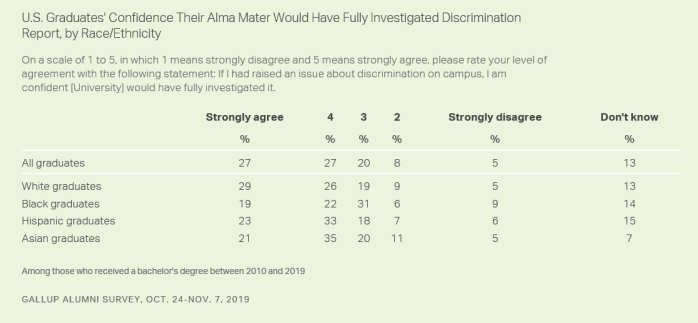You have /5 articles left.
Sign up for a free account or log in.

iStock.com/SDIProductions
A majority of college graduates, especially black alumni, are not confident their alma maters would have “fully” investigated discrimination complaints reported by the graduates while they were still students, according to a new Gallup survey of alumni who graduated with bachelor’s degrees between 2010 and 2019.
Only 27 percent of the 1,600 college graduates surveyed by Gallup last fall said they “strongly agree” that campus officials would have fully investigated such complaints, the survey report published Wednesday states.
The survey included graduates of 714 public, nonprofit and for-profit private colleges, said Stephanie Marken, author of the report and executive director of education research for Gallup.
Groups that have historically been discriminated against -- people of color, women and LGBTQ people -- were least confident in their former institutions to adequately look into reports of discrimination than those who were non-LGBTQ, white and male, the survey found. Marken said the results are concerning because the less students believe their institutions will take their complaints seriously, the less likely they are to report instances of discrimination.
“What worries me is we’re going to see depressed rates of reporting, and that’s going to lead to increased issues,” Marken said. “There’s nothing more disincentivizing than feeling in a workplace or university that you won’t be taken seriously.”

While 29 percent of white graduates said they “strongly agree” that their alma mater would have fully investigated a discrimination complaint, 19 percent of black graduates, 21 percent of Asians and 23 percent of Hispanics said the same, according to the report. Fifteen percent of black graduates said they either “disagree” or “strongly disagree” that their former institution would adequately investigate an issue of discrimination. The percentage of black graduates who feel this way seemed unusually low to Shaun Harper, founder and executive director of the Race and Equity Center at the University of Southern California.
Harper said similar research by the center has focused on asking graduates and students if they have confidence that their institution would respond adequately to a report of racism, to which they have said “quite unanimously” that they have very little to no such confidence. Students’ confidence appears to decrease when it comes to administrators “doing something in response” to discrimination versus simply investigating it, Harper said.
“Sure, there are places you can report, bias response teams that investigate, but it is the actual doing something about what is discovered where there’s a serious breakdown,” Harper said.
Marken said the survey authors intentionally chose to ask alumni about whether they believe their college would fully investigate issues of discrimination because this is a “baseline” expectation of college leaders. She said the question reflects what Gallup researchers have heard from students who have experienced discrimination -- that they want administrators to look at the incident from multiple angles and take it seriously. The results reflected a “huge” and “unacceptable” failure of colleges to take just the first step in responding to discrimination, she said.
“It’s a low bar -- fully investigating,” Marken said. “It’s not necessarily ruling in your favor or coming to a conclusion -- it’s fully investigating.”
The survey also found that LGBTQ graduates were about 4 percent less likely than their non-LGBTQ peers to think their college would investigate reports of discrimination against them. Marken noted that hate speech against gender minorities has been more prevalent on college campuses as of late. Female alumni were less likely than men to have confidence in their college to investigate discrimination complaints, with 25 percent responding they "strongly agree" their institution would do so, whereas 30 percent of male graduates said the same.
While colleges have implemented new mechanisms and policies for reporting discrimination in recent years, such as bias response teams and designated staff members or offices responsible for receiving and investigating complaints, college leaders must consistently communicate that the institution is addressing discrimination for students to feel confident about reporting instances, Marken said. Harper said an important takeaway for college leaders is the 10-point difference between the beliefs of black and white alumni that their college would be absolutely fair to them.
“We ought not be satisfied with 29 percent or 19 percent,” Harper said. “The goal should be 100 percent of our students trust us enough and be confident enough that we’re going to be fair … We want all students across all racial and ethnic groups to similarly believe that we’re going to treat them fairly and respond properly when they raise issues of discrimination.”




